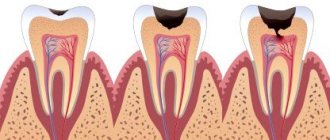When faced with such a phenomenon as a sour odor from their own mouth for the first time, people, as a rule, begin to worry first of all about the aesthetic impression that this defect makes on others.
Very few people think about the reasons for such trouble. But they can be very serious! Sour breath, the causes of which can be different, should be a reason to pay attention to the condition of your body.
Causes of bad breath
Sour breath is a symptom of gastrointestinal disease.
Often, sour breath is an alarming symptom of one of the most dangerous diseases of the gastrointestinal tract. With equal probability, the root cause of such a phenomenon may be:
- stomach or duodenal ulcer;
- gastritis;
- gastroesophageal reflux;
- chalazia cardia;
- other equally serious diseases and digestive disorders.
How can you find out what exactly caused the sour breath in your particular case? And, most importantly, how to get rid of this unpleasant phenomenon? Our article will help answer these questions.
First of all, we list the most common gastrointestinal diseases that can cause bad breath. So, “sour” breath is usually a sign of one of the following digestive disorders.
How to deal with an unpleasant odor?
If a person showers regularly and is attentive to his own hygiene, then the problem may be in the internal organs. In order to figure out exactly what the problem is, you need to contact a specialist.
The main causes of unpleasant sweating :
- Pathologies of the endocrine system. In this case, you need to contact an endocrinologist.
- Problems with the menstrual cycle. A gynecologist will help you deal with this problem.
- If you have excessive sweating on your hands, then you should see a neurologist.
- Problems with the gastrointestinal tract. In this case, you need to consult a gastroenterologist.
Often a person does not know which organ he has problems with, so there is one important factor that will help you decide. This is the characteristic smell of sweat.
- For example, if you smell acetone or chlorine, then there is a problem with the liver.
- If the smell is similar to urine, then you should pay attention to the health of the genitourinary system.
- A vinegar smell occurs in patients with tuberculosis.
- Sweetish tint of sweat in diabetic patients.
- The smell of mice is characteristic of patients with metabolic disorders.
- A distant aroma of sulfur means there is stomach disease.
There are many reasons; in order to remove the smell, you need to overcome the cause of its appearance.
But there are also physiologically strange odors of sweat that can occur periodically. They can occur if a person eats hot, spicy and bitter foods.
treatment of unpleasant sweat odor
Gastritis
Gastritis is increased acidity in the stomach.
The cause of a specific odor from the mouth may be increased acidity in the stomach, characteristic of gastritis.
Often this condition is accompanied by heartburn and other symptoms typical of digestive disorders. As for the sour smell itself, with gastritis it is not constantly felt from the mouth.
As a rule, a specific “smell” appears simultaneously with food belching and persists until the next session of eating or brushing your teeth.
Why does my vagina smell like acetone?
The characteristic pungent aroma of acetone from the vagina is an alarming sign. As a rule, the first disease that a doctor suspects is diabetes. With this pathology, the level of ketone bodies in the blood increases, the breakdown of which is accompanied by the unpleasant odor of acetone. To check the suspected diagnosis, the gynecologist will prescribe a glucose test and a consultation with an endocrinologist.
Other conditions can provoke the appearance of the smell of acetone:
- lack of fluid in the body;
- low carbohydrate diet;
- violation of metabolism and digestion of food;
- diseases of the urogenital tract;
- hormonal disbalance.
Gastroesophageal reflux
Gastroesophageal reflux is a condition in which, due to disturbances in the functioning of the gastrointestinal tract, gastric juice refluxes into the esophagus. The hydrochloric acid contained in this secretion emits a specific odor that is felt when breathing.
A particularly clearly unpleasant “smell” from the patient’s mouth is felt immediately after he wakes up. After all, during sleep a person is in a horizontal position, which means that digestive juice can flow into the esophagus absolutely unhindered.
Other characteristic symptoms of reflux are specific stomach pain, nausea and frequent belching. It is also worth noting that the described disease rarely occurs on its own. It usually accompanies gastritis and develops against the background of its exacerbations.
Possible complications
At first glance, the disease seems quite harmless and cannot lead to any adverse consequences. In fact, a vinegar smell may indicate a serious illness that needs urgent treatment. Possible complications include:
- Hypoglycemic coma : develops when there is a sharp drop in blood sugar. Diabetic patients should be aware of their disease and monitor their glucose levels to avoid such consequences.
- Formation of ulcers in the stomach and duodenum . This is a common complication of untreated gastritis.
- Gastroduodenitis, pancreatitis : occur with dysbacteriosis, when pathogenic microflora begins to spread throughout the gastrointestinal tract.
- Anemia . This complication is often observed in pathologies of the digestive system, when iron is not absorbed into the bloodstream in the proper amount. There is a drop in hemoglobin concentration.
- Cholelithiasis . It is observed when the gallbladder is not functioning properly, when stones form in it. They can interfere with normal bile drainage, which can lead to obstructive jaundice.
- Removal of a nerve or tooth . Such complications are observed in dental diseases. The patient ignores the symptoms, allowing pathogenic bacteria to multiply. The pathological process reaches the pulp and destroys the tooth.
Chalazia cardia
Gastroesophageal reflux is the reflux of gastric juice into the esophagus.
The cardia is the gastric muscular valve that connects this organ to the esophagus.
Its dysfunction (chalasia) leads to the fact that digestive juices enter cavities not intended for them. Usually this is the esophagus.
As a result, a condition with symptoms reminiscent of gastroesophageal reflux occurs.
Unlike the mentioned disease, chalazia cardia develops as an independent disease. This disorder has nothing to do with gastritis.
Sour body odor: the essence of the problem
Sweating is a necessary and natural physiological process of the human body. The norm is the release of sweat in moderate amounts and the absence of any extraneous stench. If there is increased sweating and the sweat smells like sour milk, the reasons for this phenomenon are explained by the body’s reflex response to certain external or internal factors.
What does the sour smell of sweat mean? The glands that produce sweat are distributed throughout the body. The secreted sweat fluid consists of only 10% of various organic substances, the remaining 90% is water. It is a set of organic compounds that is responsible for the smell emanating from the human body.
Removing accumulated toxins, salts and other elements from the body is one of the main functions of the sweating process. When your body smells sour, it can be caused by the following factors:
- removal of toxins in increased quantities formed during certain diseases;
- imbalance in the composition of the fluid secreted by secretions due to pathological processes in different organs;
- poor nutrition;
- blockage of the sweat channels leads to stagnation of the sweat mass and as a result the body smells sour;
Failure to comply with hygiene standards is the cause of an unpleasant “fragrance” from a person.
Depending on the predominant genesis in the human body, the aroma can be different, one of the variants of which is the sour smell of sweat.
Stomach and duodenal ulcers
Typically, ulcers of the gastrointestinal tract are asymptomatic. It is very difficult to diagnose such diseases in a timely manner (that is, before the onset of severe consequences). However, during periods of exacerbation, ulcers can manifest themselves not only with characteristic pain, but also with other symptoms. One of them is a sour smell from the mouth.
What causes this phenomenon? Many diseases of the gastrointestinal tract entail disturbances in the intestinal microflora. It is the death of the beneficial microorganisms living there that provokes an unpleasant, sharp, sour odor from the mouth, which can be felt even when breathing.
What do diseases smell like: what body odors indicate that you need to see a doctor urgently
A change in your body odor may indicate the development of a disease or chemical poisoning. If, despite following all the rules of hygiene, your skin still smells strongly of ammonia, sheep wool, or even rotten meat, you should not put off visiting a therapist. Gastroenterologist Elena Tyulpina, in an exclusive interview with 5-tv.ru, told what health problems this or that strange aroma may indicate.
“Each person’s body has its own unique smell. This smell is caused by sweat, which on the surface of the skin mixes with our microflora - bacterial and fungal flora, and after that it acquires this unique smell of ours,” the doctor explained.
If a person is healthy, then this smell is practically not noticeable and does not cause concern to its owner. But as soon as infectious diseases or other serious ailments come into play, the body begins to emit an unpleasant sour odor or leave behind its owner a trail with notes of rotting fish. Even if the disease has not yet manifested itself in full force, this factor is already enough to cause serious discomfort.
“Most often we encounter the smell of acetone from the skin of people suffering from diabetes. In people with kidney pathology, we can smell ammonia from the skin,” the specialist gave an example.
According to this principle, some characteristic smells can tell you what kind of ailment you are facing even before going to a specialist. In particular, deficiency of vitamins B and D, as well as tuberculosis, can be recognized by the vinegar aroma.
“Sometimes we can smell sheep's wool on people's skin. This is typical for people suffering from diseases of the adrenal glands or diseases of the pituitary gland. These are quite unpleasant conditions that require observation by an endocrinologist,” the doctor warned.
Some of the most intolerable odors of rotting fish and meat to the human nose can also come from the skin if there are health problems.
“This is due to the fact that there are some diseases of the gastrointestinal tract, due to which protein absorption is impaired. This protein in the intestines creates putrefactive processes, and then we smell this smell from the skin,” said the gastroenterologist.
Separately, the specialist noted signs of chemical poisoning. If a person has suffered from exposure to phosphorus and arsenic, his skin will smell like garlic. The smell of a rotting apple may indicate acetone poisoning, and a spoiled radish may indicate poisoning with selenium compounds.
“If you feel some kind of unpleasant odor from your skin or from your loved ones, this is certainly a reason to consult a doctor in order to conduct examinations, understand the reason that caused this condition, and prevent the development of complications in time,” she emphasized specialist.
However, the smells of disease and poisoning are not always repulsive. According to a study by scientists from the University of Manchester, diabetes can smell like sweet fruits or citrus fruits, and Alzheimer's disease can smell like rye bread. So it’s worth listening to your body and noting any such changes.
Earlier, 5-tv.ru wrote that a sore throat does not always indicate a cold.
Dental diseases
Gingivitis can cause bad breath.
Most often, the source of sour odor is problems directly in the oral cavity.
Dental diseases such as caries, gingivitis and periodontitis will almost certainly lead to the occurrence of this unpleasant phenomenon. Why does such a specific smell arise when problems with teeth and gums occur?
The fact is that inflammatory processes in the soft tissues around the teeth lead to the active proliferation of bacteria in the oral cavity. During their life, harmful microorganisms release many substances, most of which do not have the most pleasant odor.
Due to the specific location of the source of inflammation, a person suffering from problems with teeth and gums, as a rule, feels not only a sour smell from the mouth, but also a specific taste on the tongue.
Why does the smell appear?
The greatest amount of sweat is produced in the armpits, perineum, and also in the hollows under the knee. If a person follows all the rules of hygiene and there are no pathological changes in the body, then the sweat will not have an unpleasant odor. Sweat must be excreted from the human body for its normal functioning.
What are the functions of sweating:
- to maintain normal body temperature,
- to maintain normal water-salt balance,
- to remove toxic substances from the body,
- to protect the skin from drying out. This mechanism works by combining the secretions of the sweat and sebaceous glands, together they create a protective film.
If sweat has an unpleasant odor , then masking it with different means is not a solution. After all, this does not solve the cause of the problem, but only masks its consequences. the cause of unpleasant sweat odor . At high humidity and temperature, they actively multiply and emit this smell. Under no circumstances should you permanently block the sweat glands mechanically; the consequences may not be good.
how to deal with unpleasant sweat odor
Diaphragmatic hernia
The diaphragm, separating the chest and abdominal cavities, is equipped with a special opening. The esophagus passes through it. However, with a hernia of the diaphragm, the described hole becomes too wide. Because of this, the esophagus, normally partially located in the abdominal cavity, moves higher.
What are the consequences of such a violation? Due to the uncharacteristic bends of the esophagus, as well as its specific location, the likelihood of gastric juice entering this organ increases significantly. Well, we have already mentioned what this leads to when talking about gastroesophageal reflux and chalasia cardia.
Why does the vagina smell of semen?
After unprotected sex, the aroma of seminal fluid may remain in the genitals for several days. This is a normal condition for a healthy woman. However, the appearance of such a symptom without sexual intercourse indicates a disturbance in the composition of the microflora. This condition is not dangerous for reproductive health, but correction of the vaginal microflora is necessary.
There are cases when the aroma of semen is accompanied by irritation of the mucous membranes of the vulva and uterus. Such symptoms are a clear sign of infection. Therefore, you need to contact a gynecologist to make a diagnosis and prescribe therapy.
How can you tell if your breath smells?
Determining the freshness of your own breath is not at all easy. We adapt to the aromas that we smell all the time and stop noticing them. In addition, the oral cavity and nasopharynx are a single system, and this makes testing difficult. But there are several simple and visual ways to understand if there is a bad smell.
- Lick your wrist with the tip of your tongue and wait 15-20 seconds until the saliva dries. The scent left on the skin will give you some idea of the freshness of your breath. However, the tip of the tongue collects the smallest amount of bacteria, so the results will not be completely true.
- The main breeding ground for microflora that causes an unpleasant odor is located at the root of the tongue. Run your finger or a cotton swab in the area and smell: if the “sample” smells strong, there is a high chance that your breath may be spoiled too.
- Take a plastic cup, place it on your lips and release the air through your mouth. The smell inside the container will help determine if you are suffering from halitosis.
- Ask a loved one if he notices a specific “smell” when he communicates with you. Sometimes this is the most reliable way to find out the answer to a sensitive question.
Reasons for immediately seeking medical help
When a person smells sour, and at the same time he carefully adheres to all generally accepted hygiene standards, then this is an immediate reason to visit a doctor. The following manifestations should alert a person:
- a sharp increase in sweating at night;
- profuse sweating during the day without any particular reason;
- the appearance of an unpleasant specific odor in the secretory moisture.
Remember. Self-medication will not bring any benefit, but it can even cause harm. Only after a medical examination can you use pharmaceutical antiperspirants or undergo complex treatment to eliminate such manifestations.
Treatment at home
If a person smells vinegar from his breath, this may mean he has a number of dangerous diseases. Therefore, the first thing to do for treatment is to consult a doctor and begin the treatment prescribed by him. Without this, treatment at home is not recommended. Otherwise, the condition may worsen and the treatment of the disease that caused the problem may be complicated.
But, after diagnosis, you can resort to the folk recipes listed below.
Folk recipes
First, a few general recommendations that will reduce the likelihood of acidic breath to a minimum:
- regular brushing of teeth and tongue to avoid the accumulation of harmful bacteria;
- rinsing the mouth after eating using special herbal decoctions (water without additives is not suitable);
- Brushing your teeth with dental floss or a toothpick to remove any food particles that have accumulated between your teeth;
- regular consumption of sweet fruits, primarily melon, pear or carrot; reducing the consumption of coffee and black tea, and replacing them with clean water or green tea; Increasing the amount of apples, greens, vegetables and fiber consumed - all this contributes to the functioning of the gastrointestinal tract.
Folk recipes that will help you get rid of the unpleasant smell of vinegar or acetone from your mouth:
- Decoction of alder leaves: recipe: 1 tablespoon of dried and crushed alder leaves is poured into 0.5 liters of boiled water at a temperature of about 70-80 degrees Celsius. The broth is infused for 1 hour and filtered through gauze;
- Directions for use: rinse the mouth 6-10 times a day;
- recipe: 2 tablespoons of sunflower or olive oil are mixed with 1 teaspoon of salt, and everything is mixed until the salt is completely dissolved;
- recipe: 1-2 tablespoons of lemon balm, mint or rosehip leaves are poured with boiling water (about 0.5 liters), cooled and filtered through cheesecloth;
- recipe: 2 teaspoons of alfalfa per 1 cup of boiling water (1 serving);
You can also use fennel, clove and/or cardamom seeds. There is no need to prepare anything here. Simply chew 1 teaspoon of seeds slowly (swallowing is not advisable).










